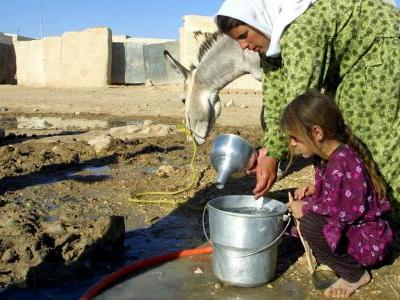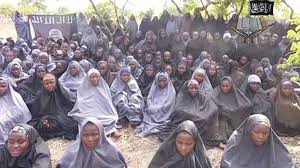Tue, 10/14/2014 - 20:34
From Nigeria to Iraq, jihadist sexual enslavement of women rises – with a twisted justification
In the summer of 2006, I interviewed a young Algerian woman who was kidnapped at knifepoint during the height of the 1990s civil war and was “asked” to marry one of her Islamist militant captors.
Yasmina – as I called her to protect her identity – was taking a shortcut through the Casbah in the Algerian capital of Algiers to get to school for her final exams when she was snatched and offered the macabre marriage proposal.
She refused, she told me, “even though I was very scared. I said I could not marry without my parents' permission. That's when the raping began.”
Eight years later, I thought of Yasmina when the news of the Boko Haram kidnapping of hundreds of girls in the northern Nigerian village of Chibok broke.
Sometimes, among the many horrors victims endure, the seemingly innocuous details stick. The Chibok girls had braved the Islamist militant threat to appear for their final exams. What is it about final examinations that endanger schoolgirls from Algeria to Nigeria, I wondered furiously. Whether it’s Algiers in the 1990s or Chibok in 2014, why can’t we secure exam halls and school routes so girls are not kidnapped, sold, sexually abused and forced into servitude?
I thought about Yasmina again this week when the group that calls itself Islamic State (IS), but I firmly call Daesh, released the fourth edition of its propaganda magazine, Dabiq.
Named after a nondescript northern Syrian town near the Turkish border, Dabiq, according to one of the hadiths, is where the apocalypse will take place and the armies of Christianity and Islam will clash – no prizes for guessing which side will win.
Dabiq is published in several languages – including English – making it the group’s leading propaganda showcase for recruiting jihadists across the world.

The latest Dabiq edition features 56 pages of mind-numbingly boring jihadist discourse – complete with the de rigueur grisly photographs – and a chapter titled, “The Revival of Slavery Before the Hour,” a screed that has rightly come under media scrutiny.
Levels of kuffardom in Daesh discourse
The tract is above all a proclamation on the status of religious minorities in the so-called Islamic State that Daesh controls. Strip away the takfiri discourse, the millenarian mumbo-jumbo and arcane justifications and you can summarize the state of minority rights in the “caliphate” in a single word: zero.
“The Revival of Slavery Before the Hour” (“the hour” being Judgment Day) features a detailed vocabulary of exclusion, much like Eskimos have many words for snow. For those of you familiar, by now, with the word kuffar or kufr (infidels in Arabic) there are now levels of kuffardom in Daesh discourse.
The lowest of the low among the kuffar is the mushrikin, or polytheists. So, while Christians and Jews are kuffar, they are not mushrikin. That’s a slur reserved in this four-page tract for the Yazidis, a Kurdish ethno-religious community that practices an ancient, syncretic religion that happens to be monotheist, but that’s a detail Daesh overlooks in its half-baked, fruitcake worldview.
The fate of the Yazidi mushrikin, according to “The Revival of Slavery Before the Hour,” is stark: “…kill the mushrikin wherever you find them, and capture them, and besiege them, and sit in wait for them at every place of ambush,” is a typical exhortation to the Daesh faithful.
Apparently, the mushrikin should be given the option to “repent” and convert to Islam – which contravenes the fundamental freedom of religion, but which is the best deal they can get. If they decline the option, the men should be put to the sword. But “their women could be enslaved unlike [other, presumably Christian and Jewish] female apostates who the majority of the fuqaha [Islamist jurists] say cannot be enslaved.”
Daesh admits sexually enslaving Yazidi women
There you have it in black and white: Daesh has issued not just a justification, but an admission that Yazidi females have been kidnapped and forced into sexual slavery.
In the days and weeks following Daesh’s onslaught on Mount Sinjar in northern Iraq, as frantic members of the Yazidi community recounted horrific stories of their women and girls being raped, kidnapped and sexually enslaved, the reports were treated with some trepidation or simply lost in the flood of awful news from northern Iraq.
Given the stigma of rape in traditional societies, the fact that the sexual abuse reports were reaching us just days and weeks after the Daesh onslaught, should have alerted us to the sheer scale of the atrocities.
But, as I said, we were snowed, and sexual violence against women is difficult to report and verify.

Months after the Daesh onslaught into the Yazidi-dominated areas of Nineveh province, corroborated reports from reliable sources are starting to emerge.
In a report published Sunday - the day the latest Dabiq edition went online – Human Rights Watch detailed forced marriages and conversions of Iraq’s Yazidis. “The group [Daesh] has systematically separated young women and teenage girls from their families and has forced some of them to marry its fighters,” said the report, citing relatives of detainees as well as Yazidis who escaped captivity.
The Human Rights Watch report documented 366 Yazidis in Daesh captivity while noting that some community elders put the figure at more than 1,000. The Iraqi government has said more than 1,500 women were detained during the onslaught in the Sinjar region.
“None of the former or current female detainees interviewed by Human Rights Watch said they had been raped, though four of them said that they had fought off violent sexual attacks and that other detained women and girls told them that Islamic State fighters had raped them,” the report noted.
Given the social disgrace of such crimes, it’s very likely that we will never know the full extent of Daesh’s latest war crime.
‘Temporary marriages’ and perversions of religious laws
Women and sex have long posed a challenge to jihadist leaders, as generals commanding armies of men throughout history have well known.
Al Qaeda’s Arab recruits in the Afghanistan-Pakistan area were encouraged to marry local women, preferably daughters of local jihadist commanders and tribal chiefs – all the better to secure and integrate foreign fighters in traditional societies.
In the Sahel area of North Africa, commanders of al Qaeda’s regional branch, AQIM (Al Qaeda in the Islamic Maghreb) also married Tuareg women, cementing local support networks in an inhospitable region.
During the Algerian civil war, “hundreds” of women were subjected to gender-based violence, according to groups such as Amnesty and Human Rights Watch. The exact number during one of the murkiest conflicts in modern history is not known.
In a perversion of religious laws on sex and marriage, women like Yasmina were subjected to nikah ul-mutta, a form of “temporary marriage” widely condemned by Sunni Muslim scholars but nevertheless twisted and adopted by militants.
The fates of these women were grim: some were discarded after the “marriage” was consummated or if fighter-husbands had to flee. Some were killed and slipped into the ranks of the estimated 6,000 to 15,000 missing, according to Algerian human rights groups. The so-called fortunate ones, like Yasmina, managed to escape. But years after the end of the civil war, as she struggled to integrate into society, Yasmina could hardly be called fortunate.
Enter a new jihadist gender atrocity regime
The latest Daesh justification of the sexual enslavement of women puts previous jihadist gender atrocity-sanctifications to shame.
“The slave girl becomes a slave to her master while his children have the status of her master over herself,” notes the Dabiq article with chilling precision.
But just when you think the discourse could not get any worse, it does. “The Revival of Slavery Before the Hour” ends with a critique of the abolition of slavery, blaming the absence of sexual slavery in particular for some of the sins of the modern world.
“The desertion of slavery has led to an increase in fahishah (adultery, fornication, etc.), because…a man who cannot afford marriage to a free woman finds himself surrounded by temptation and sin,” says the piece before adding, “many Muslim families who have hired maids to work at their homes” face this problem “whereas if she [the maid] was his concubine, this relationship would be legal.”
If the contents of the article are egregious, the form is interminably tedious. Some media reports have described Dabiq as a “glossy recruiting magazine”. But this is no jihadist-gonzo journalism. Instead, we have realms of takfiri gobbledygook running from page to insufferable page, packed with stumbling Arabic transliterations and exhortations.
‘Enslaved women were given to foreign fighters’
If this is what lures Western foreign fighters into Daesh’s arms, we really need to examine what’s gone wrong with our education systems and why some of our citizens can be lured by such jejune propaganda material.
Because there’s little doubt the Dabiq article on the sexual slavery of mushrikin/Yazidi women is targeted at foreign fighters in Daesh ranks.
The Arabic version of the magazine does not feature “The Revival of Slavery Before the Hour,” presumably because local fighters are not the target audience.
“I guess it was published in English and not Arabic since the enslaved women were given to foreign fighters, Western fighters,” said FRANCE 24’s Wassim Nasr, an expert on jihadist groups, adding that this information was confirmed by David Thomson, a journalist at RFI, FRANCE 24’s sister radio station . “French fighters told him that Yazidi women were sold and bought before the publication of [the latest edition of] Dabiq.”

The abduction, selling and purchasing of Yazidi female captives mirrors the reports that the Chibok girls kidnapped by Boko Haram militants in Nigeria were sold into sexual slavery.
Exactly six months ago, when more than 200 Nigerian schoolgirls were kidnapped from their dormitories, the incident sparked international outrage, including a social media campaign that had the likes of Michelle Obama calling to #BringBackOurGirls, while the leaders of Nigeria and neighboring nations rushed to Paris to declare their commitment to fighting the latest terror threat.

Half-a-year later, Nigerian police on Tuesday blocked protesters in the capital of Abuja from marching to the presidential residence. Security forces outnumbered the protesters, according to reporters on the scene, and the ineptly-named Nigerian President Goodluck Jonathan once again failed to make an official appearance or statement on the six-month anniversary of the kidnappings.
Nearly two decades after Yasmina was abducted and forced into sexual slavery at the height of what Algerians call their worst post-colonial years, our women and girls are not safer than they were decades ago. The menace is only increasing – along with the arcane, twisted justifications put forth by intellectually-challenged men with guns masquerading as jurists and legal scholars.
Yasmina – as I called her to protect her identity – was taking a shortcut through the Casbah in the Algerian capital of Algiers to get to school for her final exams when she was snatched and offered the macabre marriage proposal.
She refused, she told me, “even though I was very scared. I said I could not marry without my parents' permission. That's when the raping began.”
Eight years later, I thought of Yasmina when the news of the Boko Haram kidnapping of hundreds of girls in the northern Nigerian village of Chibok broke.
Sometimes, among the many horrors victims endure, the seemingly innocuous details stick. The Chibok girls had braved the Islamist militant threat to appear for their final exams. What is it about final examinations that endanger schoolgirls from Algeria to Nigeria, I wondered furiously. Whether it’s Algiers in the 1990s or Chibok in 2014, why can’t we secure exam halls and school routes so girls are not kidnapped, sold, sexually abused and forced into servitude?
I thought about Yasmina again this week when the group that calls itself Islamic State (IS), but I firmly call Daesh, released the fourth edition of its propaganda magazine, Dabiq.
Named after a nondescript northern Syrian town near the Turkish border, Dabiq, according to one of the hadiths, is where the apocalypse will take place and the armies of Christianity and Islam will clash – no prizes for guessing which side will win.
Dabiq is published in several languages – including English – making it the group’s leading propaganda showcase for recruiting jihadists across the world.

The latest Dabiq edition features 56 pages of mind-numbingly boring jihadist discourse – complete with the de rigueur grisly photographs – and a chapter titled, “The Revival of Slavery Before the Hour,” a screed that has rightly come under media scrutiny.
Levels of kuffardom in Daesh discourse
The tract is above all a proclamation on the status of religious minorities in the so-called Islamic State that Daesh controls. Strip away the takfiri discourse, the millenarian mumbo-jumbo and arcane justifications and you can summarize the state of minority rights in the “caliphate” in a single word: zero.
“The Revival of Slavery Before the Hour” (“the hour” being Judgment Day) features a detailed vocabulary of exclusion, much like Eskimos have many words for snow. For those of you familiar, by now, with the word kuffar or kufr (infidels in Arabic) there are now levels of kuffardom in Daesh discourse.
The lowest of the low among the kuffar is the mushrikin, or polytheists. So, while Christians and Jews are kuffar, they are not mushrikin. That’s a slur reserved in this four-page tract for the Yazidis, a Kurdish ethno-religious community that practices an ancient, syncretic religion that happens to be monotheist, but that’s a detail Daesh overlooks in its half-baked, fruitcake worldview.
The fate of the Yazidi mushrikin, according to “The Revival of Slavery Before the Hour,” is stark: “…kill the mushrikin wherever you find them, and capture them, and besiege them, and sit in wait for them at every place of ambush,” is a typical exhortation to the Daesh faithful.
Apparently, the mushrikin should be given the option to “repent” and convert to Islam – which contravenes the fundamental freedom of religion, but which is the best deal they can get. If they decline the option, the men should be put to the sword. But “their women could be enslaved unlike [other, presumably Christian and Jewish] female apostates who the majority of the fuqaha [Islamist jurists] say cannot be enslaved.”
Daesh admits sexually enslaving Yazidi women
There you have it in black and white: Daesh has issued not just a justification, but an admission that Yazidi females have been kidnapped and forced into sexual slavery.
In the days and weeks following Daesh’s onslaught on Mount Sinjar in northern Iraq, as frantic members of the Yazidi community recounted horrific stories of their women and girls being raped, kidnapped and sexually enslaved, the reports were treated with some trepidation or simply lost in the flood of awful news from northern Iraq.
Given the stigma of rape in traditional societies, the fact that the sexual abuse reports were reaching us just days and weeks after the Daesh onslaught, should have alerted us to the sheer scale of the atrocities.
But, as I said, we were snowed, and sexual violence against women is difficult to report and verify.

Months after the Daesh onslaught into the Yazidi-dominated areas of Nineveh province, corroborated reports from reliable sources are starting to emerge.
In a report published Sunday - the day the latest Dabiq edition went online – Human Rights Watch detailed forced marriages and conversions of Iraq’s Yazidis. “The group [Daesh] has systematically separated young women and teenage girls from their families and has forced some of them to marry its fighters,” said the report, citing relatives of detainees as well as Yazidis who escaped captivity.
The Human Rights Watch report documented 366 Yazidis in Daesh captivity while noting that some community elders put the figure at more than 1,000. The Iraqi government has said more than 1,500 women were detained during the onslaught in the Sinjar region.
“None of the former or current female detainees interviewed by Human Rights Watch said they had been raped, though four of them said that they had fought off violent sexual attacks and that other detained women and girls told them that Islamic State fighters had raped them,” the report noted.
Given the social disgrace of such crimes, it’s very likely that we will never know the full extent of Daesh’s latest war crime.
‘Temporary marriages’ and perversions of religious laws
Women and sex have long posed a challenge to jihadist leaders, as generals commanding armies of men throughout history have well known.
Al Qaeda’s Arab recruits in the Afghanistan-Pakistan area were encouraged to marry local women, preferably daughters of local jihadist commanders and tribal chiefs – all the better to secure and integrate foreign fighters in traditional societies.
In the Sahel area of North Africa, commanders of al Qaeda’s regional branch, AQIM (Al Qaeda in the Islamic Maghreb) also married Tuareg women, cementing local support networks in an inhospitable region.
During the Algerian civil war, “hundreds” of women were subjected to gender-based violence, according to groups such as Amnesty and Human Rights Watch. The exact number during one of the murkiest conflicts in modern history is not known.
In a perversion of religious laws on sex and marriage, women like Yasmina were subjected to nikah ul-mutta, a form of “temporary marriage” widely condemned by Sunni Muslim scholars but nevertheless twisted and adopted by militants.
The fates of these women were grim: some were discarded after the “marriage” was consummated or if fighter-husbands had to flee. Some were killed and slipped into the ranks of the estimated 6,000 to 15,000 missing, according to Algerian human rights groups. The so-called fortunate ones, like Yasmina, managed to escape. But years after the end of the civil war, as she struggled to integrate into society, Yasmina could hardly be called fortunate.
Enter a new jihadist gender atrocity regime
The latest Daesh justification of the sexual enslavement of women puts previous jihadist gender atrocity-sanctifications to shame.
“The slave girl becomes a slave to her master while his children have the status of her master over herself,” notes the Dabiq article with chilling precision.
But just when you think the discourse could not get any worse, it does. “The Revival of Slavery Before the Hour” ends with a critique of the abolition of slavery, blaming the absence of sexual slavery in particular for some of the sins of the modern world.
“The desertion of slavery has led to an increase in fahishah (adultery, fornication, etc.), because…a man who cannot afford marriage to a free woman finds himself surrounded by temptation and sin,” says the piece before adding, “many Muslim families who have hired maids to work at their homes” face this problem “whereas if she [the maid] was his concubine, this relationship would be legal.”
If the contents of the article are egregious, the form is interminably tedious. Some media reports have described Dabiq as a “glossy recruiting magazine”. But this is no jihadist-gonzo journalism. Instead, we have realms of takfiri gobbledygook running from page to insufferable page, packed with stumbling Arabic transliterations and exhortations.
‘Enslaved women were given to foreign fighters’
If this is what lures Western foreign fighters into Daesh’s arms, we really need to examine what’s gone wrong with our education systems and why some of our citizens can be lured by such jejune propaganda material.
Because there’s little doubt the Dabiq article on the sexual slavery of mushrikin/Yazidi women is targeted at foreign fighters in Daesh ranks.
The Arabic version of the magazine does not feature “The Revival of Slavery Before the Hour,” presumably because local fighters are not the target audience.
“I guess it was published in English and not Arabic since the enslaved women were given to foreign fighters, Western fighters,” said FRANCE 24’s Wassim Nasr, an expert on jihadist groups, adding that this information was confirmed by David Thomson, a journalist at RFI, FRANCE 24’s sister radio station . “French fighters told him that Yazidi women were sold and bought before the publication of [the latest edition of] Dabiq.”

The abduction, selling and purchasing of Yazidi female captives mirrors the reports that the Chibok girls kidnapped by Boko Haram militants in Nigeria were sold into sexual slavery.
Exactly six months ago, when more than 200 Nigerian schoolgirls were kidnapped from their dormitories, the incident sparked international outrage, including a social media campaign that had the likes of Michelle Obama calling to #BringBackOurGirls, while the leaders of Nigeria and neighboring nations rushed to Paris to declare their commitment to fighting the latest terror threat.

Half-a-year later, Nigerian police on Tuesday blocked protesters in the capital of Abuja from marching to the presidential residence. Security forces outnumbered the protesters, according to reporters on the scene, and the ineptly-named Nigerian President Goodluck Jonathan once again failed to make an official appearance or statement on the six-month anniversary of the kidnappings.
Nearly two decades after Yasmina was abducted and forced into sexual slavery at the height of what Algerians call their worst post-colonial years, our women and girls are not safer than they were decades ago. The menace is only increasing – along with the arcane, twisted justifications put forth by intellectually-challenged men with guns masquerading as jurists and legal scholars.
Comments or opinions expressed on this blog are those of the individual contributors only, and do not necessarily represent the views of FRANCE 24. The content on this blog is provided on an "as-is" basis. FRANCE 24 is not liable for any damages whatsoever arising out of the content or use of this blog.




0 Comments
Post new comment